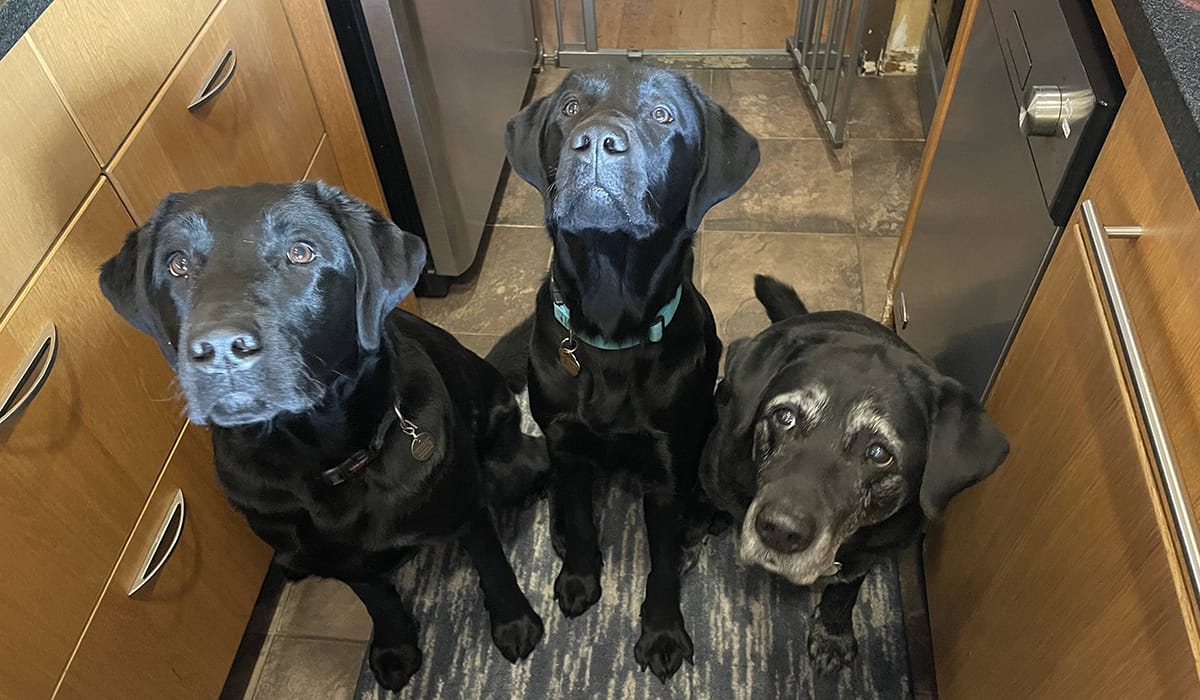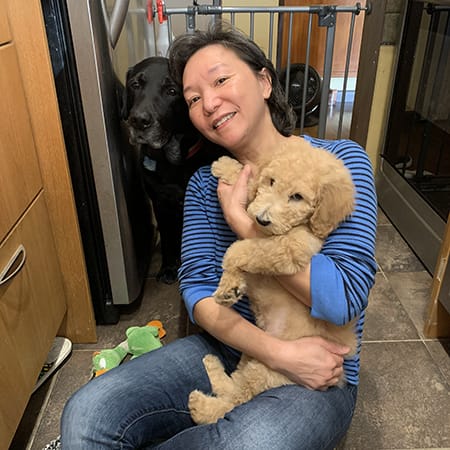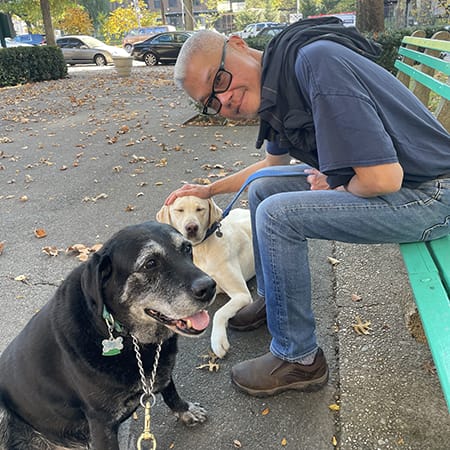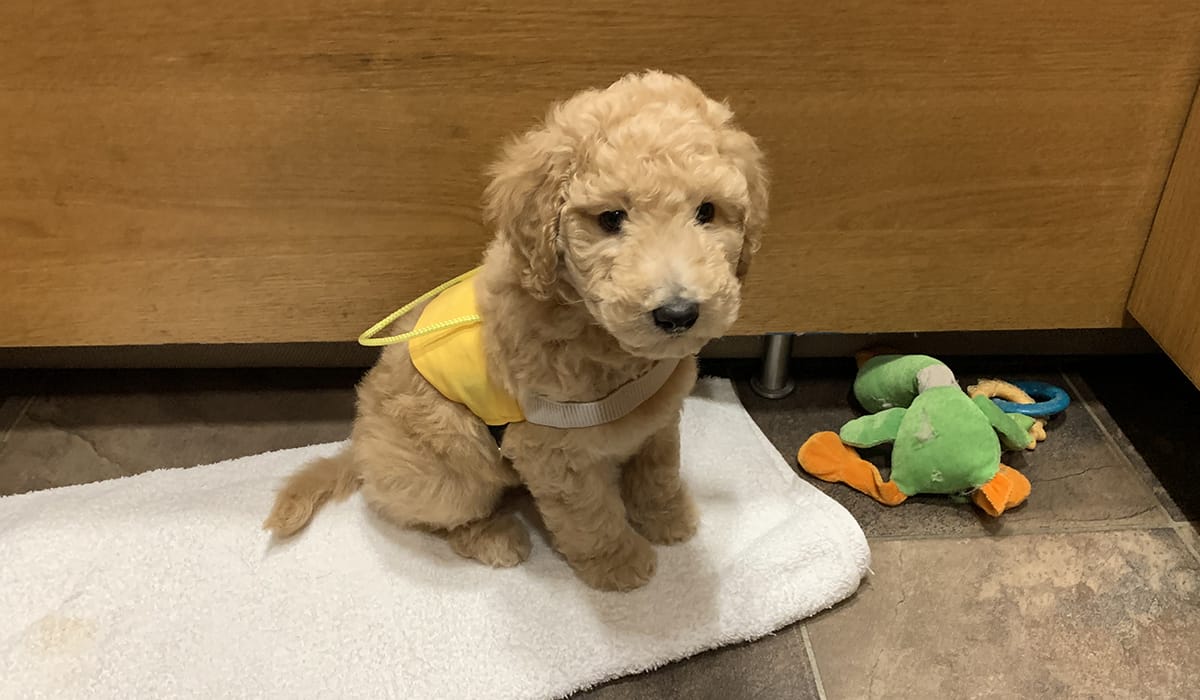New York Couple Provides a Home Base for Future Service Dogs

Meet Daily Point of Light Award honoree Peg Wong and Ed Chan. Read their story, and nominate an outstanding volunteer or family as a Daily Point of Light.
When Ed Chan and Peggy Wong arrived for a wine dinner hosted by Ed’s company in 2012, neither of them could have expected that it would change their lives. They’d been living in New York for over a decade, and Ed’s career had spanned restaurants and hospitality, food and wine.
“The fella that sat next to me turned out to be an official for the Guide Dog Foundation, so that’s really how my knowledge the awareness came about,” Ed recalls of his introduction to the volunteer opportunity that eventually filled his and Peg’s home with canines.
The Guide Dog Foundation (GDF) was formed after World War II to train and provide dogs to veterans returning home from conflicts. Today, they are focused on helping people who are blind, have low vision or live with other disabilities free of charge. Its sister organization, America’s VetDogs, fulfills the original mission of providing dogs to veterans—and now active-duty service members and first responders—with disabilities to enhance their mobility and renew their independence.
By the end of the evening, Ed was sold on the program, and he and Peg decided to volunteer. While the former had never had pets before the couple’s two cats, Peg’s family had been in the pet business. Both loved dogs. Their first foray into the world of service dogs, resulted in Babe, a baby black lab.
“We started off as what they call puppy raisers, which is an 18-month commitment where you’re going to be a parent to a young pup, take them to class, and teach them basic disciplinary things.”

At the end of the period, they turned him back over to the foundation for more formal training. Unfortunately, between rigorous testing and required behavioral traits, Babe didn’t clear the bar to move forward. Lucky for Ed and Peg, they had first option to adopt. Now, Babe is a permanent resident of their home and part of the welcome committee when other trainees come to stay.
In the beginning, they mainly hosted 6- to 8-week-olds for home socialization but, post-pandemic, they find themselves as more of a temporary placement home for older pups needing a place to crash while their raisers are out of town or to work on behavioral issues. The goal is to expose them to different smells and services, teach them to calm down after encountering distractions and guide them into an early routine.
Ed and Peg have learned to be patient. With one, two or sometimes even three dogs in their care at once, they acknowledge that each learns differently and must be catered to.
“It’s a lot of time and effort. Yes, sometimes with a little pup, it’s a lot of cleaning up after them, too. But how can you turn down those faces? It’s perpetual puppy love,” Ed effuses.
Geremie Callahan and her husband met Peg and Ed decades ago through the men’s work in the wine industry. Geremie has seen firsthand the enthusiasm their friends bring to the role.
“They don’t mind that it’s a puppy who has to go out six times a day. And they live in an apartment, so it’s the elevator and this and that. They just love it so much,” she says.
The Callaghans are also dog-lovers and, while they don’t work with GDF, were inspired by their friends’ passion. Not only did they end up adopting the first canine they fostered, but they continue to host pups a couple of times a year. While Geremie empathizes with the feelings associated with a dog simply passing through on the way to their forever home, she notes how Ed and Peg have learned to enjoy the process and keep the mission in mind.

“When you understand what it takes to get a dog through the program, you’re so happy to have played a part. And that’s what I see in Ed and Peg. They’re so happy to have participated in the dog’s life but also in what the dog does for their career [as a service animal],” she says.
GDF sees a wide variety of trainees—Labrador Retrievers, Golden Retrievers, lab-golden crosses and sometimes hypoallergenic poodles—all of which have passed through Ed and Peg’s apartment.
“People who have allergies can be paired with a poodle and won’t have any problems,” Ed explains. “For that matter, of all the breeds that we’ve handled, the poodles—I call them noodles—are the smartest bunch around, hands down.”
One standout was Mario, a cream-colored poodle who arrived at the house as a 6-week-old. He remains the only puppy to escape the gated kitchen, their designated bedtime space.
“One night he sneaked out, did his business in the living room, then sneaked back into the kitchen to go back to bed with Babe as if nothing happened. We were baffled for days until we caught him in the act,” Ed laughs.
Peg enjoyed practicing her professional grooming skills on the Mario and his fellow noodle. Today, Mario is 4 years old and working as a service dog.
“To paraphrase Forrest Gump, guide dogs are like a box of chocolates, you never know what you’re going to get. But one thing is for sure: the love you receive is pure and unconditional,” Peg adds. “Since COVID, I’ve been able to work from home, and the pups have been a welcome break from the monotony and stress. The extra doggie walks also forced me to exercise more.”
The pandemic took a toll on the service industry as well, leaving Ed out of a job. Spending his days with the dogs was a point of joy, even after he returned to work. With seasonal gigs with the New York Mets, Ed has even taken the initiative to engage sports teams to sponsor dogs. The Mets already support two: Seaver, after Tom Seaver, and Shea, after Shea Stadium.

“Seeing the pups always puts a smile on your face, even when you walk back home because you felt crappy from work. You come back into the house and look at those eyes. It’s very heartwarming,” Ed says about finding meaning in the work. “I think our stress levels over the years have been tempered because we’ve got these animals to distract us. They have been helpful to our health and wellbeing.”
Having hosted 96 dogs and counting, Ed and Peg have no intention of slowing down. After the passing of their two original “four-leggeds”—a term Ed has coined for the two Persians and many dogs in their care—Babe is currently the only one in the house, but the couple is already thinking of more ways they can care for their furry friends when they retire.
“We’ve had some talks that perhaps, down the road, we could run a property out in the country somewhere with a big old backyard and welcome retired dogs as a haven,” Ed muses. “That’s something in our dreams, but regardless what the future looks like, I’m sure our house is going to be packed with animals.”
Do you want to make a difference in your community like Peg and Ed? Find local volunteer opportunities.
